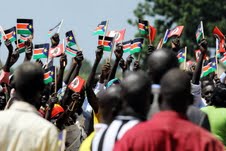
The similarities between Western Sahara and Sudan's Abyei region are stark. At a panel at the Wilson Center earlier this month, “Resolving Regional Conflicts: The Western Sahara and the Quest for a Durable Solution,” experts discussed the plight of the Sahrawi people's quest for self-determination in Western Sahara, highlighting the intractability of the situation. The precedents set in Western Sahara are disheartening. If African Union, Sudanese, and South Sudanese leaders do not proactively address the Abyei tinderbox, it is in danger of facing the same fate as Western Sahara, which some experts say is now too far gone to resolve.
Although Sudanese and South Sudanese authorities agree that the people of Abyei have a right to a referendum vote, they have repeatedly failed to agree on referendum terms. As a consequence, four decades after the people of Abyei were first promised a chance to vote on their futures, no internationally sanctioned vote has been conducted. At the end of October 2013, as a third proposed referendum date passed them by, the Ngok Dinka people of Abyei organized a vote of their own. Now, as the nomadic Misseriya begin their migration south, tensions are high. A history of episodic violence in Abyei means that the international community cannot afford to wait to resolve the issue.
In Western Sahara, the U.N. brokered a ceasefire 22 years ago, but the referendum that was meant to follow never happened. Two decades later, Sahrawi people continue to protest Moroccan rule. The Moroccan government is accused of attempting to prolong the conflict out of hope that the Sahrawi people would accept annexation. In recent advocacy around Morocco's election to the Human Rights Council, NGOs have highlighted this problematic refusal to effectuate the group's right to self-determination. According to Human Rights Watch, Morocco has effectively criminalized advocacy for Sahrawi self-determination. The Sahrawi political party, the Polisario Front, has not yielded to this pressure, continuing to demand a referendum that includes an option for complete sovereignty, which Morocco persistently resists.
In Western Sahara, although the U.N. has mandated a referendum, neither side is making concrete, viable steps forward. In contrast, in Abyei, a credible plan is on the table. A lasting solution in Abyei does not require creating a new country. It just requires assigning permanent sovereignty to either Sudan or South Sudan. Still, as in Western Sahara, logistics have been complicated by the movements of nomads and a history of displacement of indigenous populations. While some in Abyei argue that the nomadic Misseriya should not be allowed to participate, since they are not resident in the area, the Sudanese government is adamant that any referendum include Misseriya input. In Western Sahara, although the Sahrawi people are the target population, the Moroccan government hopes to secure voting rights for thousands of Moroccans that it has encouraged to settle in the past two decades.
According to Wilson Center senior scholar Marina Ottoway, “In fact, there is no [Moroccan] autonomy proposal on the table right now.” This stagnation, ongoing for over two decades, limits the viable solutions to this conflict as frustrations grow within the Sahrawi population and 90,000 Sahrawi refugees suffer dismal conditions in neighboring camps. The lack of progress had panel members expressing bleak prospects for a solution. As Ms. Ottaway puts it, Western Sahara and similar situations “probably in the end are never going to have a clear-cut solution.” In both cases, dreams of self-determination have been deferred as leaders grapple over who would participate in a referendum.
The United Nations Mission for the Referendum in Western Sahara , or MINURSO, was authorized in 1991 and now hosts 233 military personnel tasked with ensuring a ceasefire, reducing the threat of mines, and supporting confidence-building. In Abyei, the United Nations Interim Security Force for Abyei , or UNISFA, was mandated in 2011 and now deploys 4,076 military personnel to monitor this flash point border region. Due to the presence of arms and mines in Abyei, its essential to mitigate against future violence. In Western Sahara, the bare bones U.N. mission, which was meant to carry out the referendum, has been tasked with mine removal too. Histories of displacement plague both regions, providing a concrete and glaring example of the human cost of these protracted conflicts. What we can learn from the prolonged situation in Western Sahara is that the time for Abyei is now, lest negotiations become completely immovable.
U.S. representatives have been vocal in vying for resolutions to these clashes, championing a wider MINURSO mandate in Western Sahara and backing the African Union’s proposal to bring stability to Abyei. The U.N. Security Council voted to "support strongly" former Secretary of State James Baker's proposals for resolving the Western Sahara dispute over a decade ago. Both former Special Envoy Gen. Scott Gration and current U.S. Secretary of State John Kerry engaged on the Abyei issue in the past.
Today in Abyei, the framework for a lasting solution is in place with the African Union High-Level Implementation Panel, or AUHIP, proposal on Abyei put forth in 2012. Unlike Western Sahara, this plan has a chance of working. In a recent Enough Project report, Timothy May and Akshaya Kumar argue that it is up to African Union, Sudanese, and South Sudanese leaders to engage the Abyei community and take concrete steps to implement that plan. Recently, the African Union Peace and Security Council visited the Abyei region. Upon its return, it urged the U.N. Security Council to endorse the AUHIP plan. Now, it's time for action.
Photo: Celebrations by Ngok Dinka during the Abyei community referendum result declaration (Enough Project)

